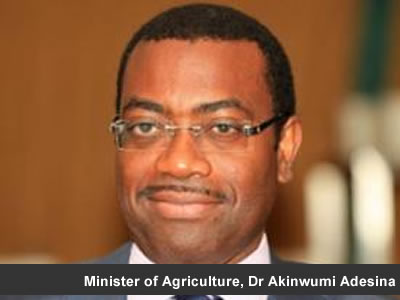The Minister of Agriculture and Rural Development, Dr. Akinwumi Adesina has said since the Agriculture Transformation Agenda, ATA, was initiated, the journey so far has been impressive and at the end, the administration will fulfill its promises.
He made this public yesterday in Abuja while presenting his keynote address at the national seminar on Agricultural Commodity Value Chain Development in Nigeria and formal presentation of the report of a baseline study of selected agricultural commodities.
The seminar and presentation was organized by Agricultural and Rural Management Training Institute, ARMTI during which the minister also said the reports by the agency over the years have helped in repositioning the sector in Nigeria.
According to Dr. Adesina, he has travelled all the nooks and cranny of the country and has gotten first hand information on the journey so far whereupon he can authoritatively say, much has been covered.
Dr. Adesina used the occasion to give a rundown of the achievements recorded in the sector pointing out that, in the value chain approach, where all players are made to maximally benefit from the dividends that abounds in the sector, has led to a situation where the era of food importation will sooner than later be phased out.
“The era of food importation will soon be over hence machineries have been put in place to take care of this. We should be exporting food to other countries instead of importing it, especially in areas that we have comparative advantage. Nigeria must be a food self-sufficient nation. Agriculture must be run in such a way that all the potentials in the sectors are unlocked. The focus of this administration is to ensure that the sectoral issues that hindered the development of the sector are confronted”, he maintained.
He announced that, the value chain areas in focus including, cassava, sorghum, palm oil, cocoa and rice have been facelifted just as the “massive corruption in fertilizer procurement that has lasted for long has now been eliminated.
Other important milestones according to him include Growth Enhancement Support, GES, scheme, integration of the younger generation into the system as well as procurement of massive foreign investment and domestic food production hitting 8.1million metric tons.
Earlier in his welcome address, Mr. S. O. Afolayan, the acting executive director, ARMTI Ilorin, informed the gathering that, “In the spirit of putting in our quota, the Agricultural and Rural Management Training Institute (ARMTI) Ilorin, has embarked on a study on prevailing situations in selected agricultural commodity value chains with the aim of providing, through its findings, a veritable launching-point for a knowledge-based take-off of the commodity value chain development in Nigeria”.
He also reminded that “Value Chain Development is not only about value addition to commodities. After all, our farmers, processors and marketers have in one way or the other (no matter the measure), added value to their products. The value chain development process encompasses the full range of activities and services required to bring a product from its conception to consumption. In the value chain there are main actors, secondary and tertiary actors. The value chain includes input suppliers, producers, processors/marketers and buyers/consumers. They are supported by a range of technical, business and financial service providers. Value chain development lays emphasis on functional linkages among all the players/stakeholders in value addition activities in recognition of mutual interdependence.
In other words, value chain development is a function of partnership, relationship, trust, commitment and governance to ensure the sustainability of agri-business, through cost reduction, higher quality of products, more social responsibility and new ways of coordinating activities in agriculture. Most agricultural production is increasingly integrated in value chains with forward (marketing) and backward (input supply) linkages”.
Journey So Far Is Impressive-Agric Minister



